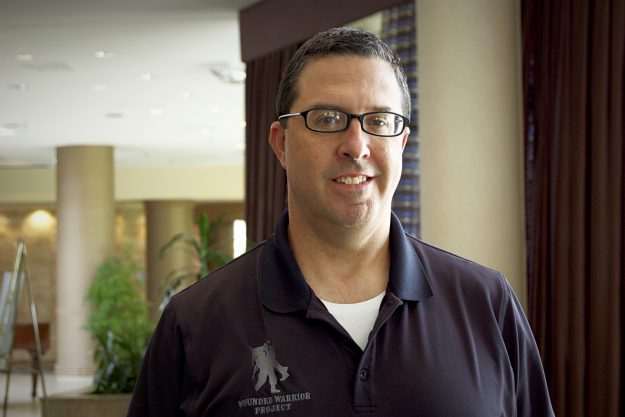Meet the StateScoop 50 GoldenGov Nominees: Arkansas CTO Mark Myers

Since Mark Myers started as chief technology officer in Arkansas in early 2015, he’s put a premium on boosting broadband, cybersecurity and mobility.
One of his most notable projects: Myers spearheaded an effort to upgrade all of the state’s K-12 schools to a fiber-enabled broadband network with speeds at double that recommended by the Federal Communications Commission. While the project isn’t finished yet, the state is on track to upgrade more than half of the schools in the state by the end of fiscal year 2016.
Myers’ work landed him a spot on the list of nominees for the StateScoop 50’s “Golden Gov” category, which recognizes visionaries leading state government into a new technology landscape.
StateScoop talked to Myers to hear more about his work in Arkansas and his goals for the future.
Editor’s note: This interview was edited for clarity and conciseness.
StateScoop: Tell us about some of your main achievements over the past year that may have resulted in your nomination for a GoldenGov award?
Mark Myers: I am particularly proud of what we have achieved in K-12 broadband. With the support and leadership of Gov. Asa Hutchinson, we set forth an ambitious plan to upgrade all of our K-12 schools to an all-fiber, high-speed broadband network entirely within the Department of Education’s existing budget.
Our original goal was to provide 100 Kbps per user, but we were able to double that to 200 Kbps per user. My department, the Department of Information Systems, or DIS, created an interactive, color-coded map where our stakeholders can track the progress of the network upgrade. It is exciting to watch as the colors on the map gradually change from gray to green as more schools are connected.
I am also proud that, by establishing consistency in the equipment and related components, the technology coordinators in our school districts are able to speak in a common language. They are able to talk with each other about any issues they encounter. This gives them the ability, in many cases, to troubleshoot issues among peers versus having to rely solely on our network or LAN field support technicians for assistance. A national organization that conducted a thorough study of the K-12 broadband landscape in our state said that, once completed, Arkansas could become one of only three states in the nation — the other two are Hawaii and Wyoming — to have achieved 100 percent high-speed, fiber optic broadband connectivity to its public school system.
This project benefits more than 500,000 students, teachers, district administrative staff and education cooperatives. Furthermore, this project has the capacity to encourage broadband expansion by our provider community into rural parts of the state where 84 percent of Arkansans do not have access to FCC-defined broadband. Our K-12 network upgrade is a two-year project. By the end of fiscal year 2016, our goal is to have upgraded 126 out of 274 school districts.
SS: What’s been the biggest challenge you guys have faced in the past year? How’d you overcome it?
MM: Like other government agencies across the nation, tight budgets have been a challenge. This is especially challenging when your agency is responsible for cybersecurity and keeping citizen and government data safe from compromise.
The stakes are enormously high. Arkansas is fortunate to have a governor who previously served as director of the Drug Enforcement Administration and was the first undersecretary of the Department of Homeland Security. When it comes to cybersecurity, he gets it and has been extremely supportive in helping DIS secure the needed funding to conduct critical upgrades to our cyber defenses.
SS: Why public service? What lessons would you like to share with the next generation of state and local IT leaders?
MM: Arkansans are very passionate about the state. We take a lot of pride when our state is recognized for an achievement, whether it is an athletic achievement, political achievement, entertainment achievement, or business or economic achievement. Working in public service is an extension of the passion and pride of being an Arkansan and doing work that has the ability to make a real difference in the lives of other Arkansans. With Arkansas leading the nation in the percentage of mobile-only households, technology is at the forefront. What we do gives citizens convenient access to critical government services and information where they live and work. We have also developed a mobile platform to enable the citizens to take advantage of 24×7 digital government.
The lessons learned in my life have really been those that apply to what I do and they fall into three categories:
1. Go faster — Never accept the speed at which government normally goes as being okay.
2. Ships turn slowly — People and organizations take time to change.
3. Get mad — When things are bogging down and people seem not to follow the change you intend, then get angry and express it. Showing anger has to be a very deliberate action by a leader; but, anger shows passion. People want to work with and be around those who motivate them.
SS: What advice do you have for next year’s eventual class of GoldenGov nominees?
MM: My advice to those in next year’s class is at the end of the day, be yourself. Only you have to look at yourself in the mirror every day. Read, read and read some more, because you should drive your own professional development. Oh and be a social media fiend … maybe, I should have waited to share that one until after this year’s voting was over!
This Q&A is part of a StateScoop series highlighting the nominees for the StateScoop 50 GoldenGov award. To vote for this nominee, and to vote in the other categories up for awards, go to the StateScoop 50 awards page. Winners of the StateScoop 50 awards will be announced on May 4.




